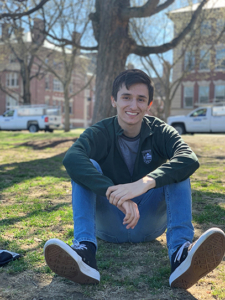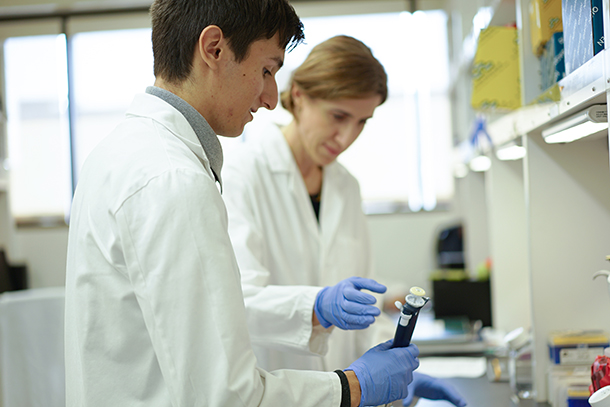Every weekday afternoon, high school senior Anthony Ball walks from Francisco Bravo Medical Magnet High School to a sixth-floor lab in the USC John Stauffer Pharmaceutical Sciences Center. He’s used to the routine by now: He puts on his white lab coat, picks up a pipette and gets to work.
At just 18 years old, Ball is an integral part of the research team led by Houda Alachkar, PharmD, PhD, that’s looking at whether midostaurin — the first new drug in nearly two decades to receive authorization to treat acute myeloid leukemia (AML) — has potential benefits if used in bone marrow transplant patients. AML, a cancer of the blood and bone marrow, has the highest mortality rate of all leukemias and is one of the most common types of leukemia in adults.
“Anthony has matured so much as a scientist over the past year,” said Alachkar, assistant professor of clinical pharmacy at the USC School of Pharmacy. “He’s picked up complex concepts quickly and is a big asset to our team.”
Ball, who’s from the Cypress Park neighborhood near Downtown Los Angeles, is part of USC’s Science, Technology and Research (STAR) program, funded by a USC Good Neighbors grant, that pairs Francisco Bravo Medical Magnet High School students with USC faculty mentors and provides hands-on research experiences in laboratories.
“The program allows high school students to gain experience in real science,” said USC School of Pharmacy Professor Daryl Davies, PhD, who serves as STAR’s program director. “They’re trained to look at a research question, test different hypotheses and come up with viable ways to address the question.”
The result is undeniable: 100% of the more than 800 students who’ve gone through STAR go to college, 98% attend top-tier research universities like MIT, Stanford and Harvard, and 97% receive academic scholarships.
First-generation student secures full scholarship

Anthony Ball during a visit to Dartmouth College where he will major in pre-health starting in the fall. (Photo/Courtesy of Anthony Ball)
Ball is writing his own success story. He’ll be attending Dartmouth College in the fall and recently has been selected as one of 300 student leaders across the country to receive The Gates Scholarship — a full scholarship for college.
He plans to major in pre-health and eventually become a pediatrician or pathologist.
“My parents have never heard of Dartmouth and don’t know it’s an Ivy League school, but they’re always proud of my accomplishments,” he said.
As a first-generation college student who grew up in a blue-collar household, the full scholarship has lifted a huge burden. Even though his parents never went to college, they’ve always emphasized the value of education and wanted to figure out a way to support him, Ball said.
“I asked my parents how they felt about contributing $5,000 every year for tuition,” he said. “It felt so good to tell them, ‘Now you don’t have to anymore!’”
Fostering a love of science
Ball has always been interested in science, but it wasn’t until hearing STAR students present their projects on alcoholism that he was turned on to research.
“I just sat there thinking how cool it’d be to work in a lab and help solve sophisticated problems,” he said.
Since he started working in Alachkar’s lab in June 2018, he’s gained skills he wouldn’t have learned in a traditional classroom setting. He spends a few hours every Monday through Friday counting and culturing cells, setting up drug treatments, checking cell viability and processing visual data by creating graphs and charts. Lucas Gutierrez, a PhD candidate who’s mentored Ball over the past year in Alachkar’s lab, is quick to praise not only the high school senior’s curiosity and growth mindset, but also an amicable nature that has helped him work well in a team setting.
“Anthony understands his role is to learn from us, but he also isn’t afraid to ask us the hard questions that challenge our ideas,” Gutierrez said.
STAR students have the opportunity to present their original research at local and national competitions. In March, Ball was selected to present his poster, “A Comparison of Sensitivity to Midostaurin Between Leukemia Cells Expressing the CD99 Short and Long Isoforms,” at the Los Angeles County Science and Engineering Fair.
“The STAR program has opened so many doors for me that I never thought possible,” Ball said. “It’s given me the confidence to pursue science by knowing I’m capable of working alongside college students, master’s students and PhD candidates.”
— Linda Wang


